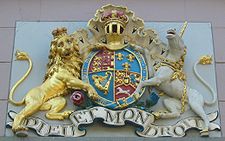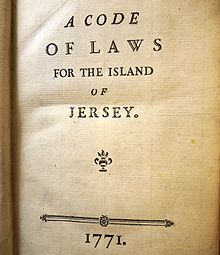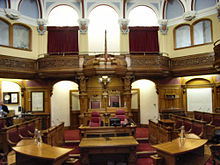- States of Jersey
-
Jersey 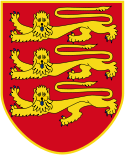
This article is part of the series:
Politics and government of
JerseyGovernmentLegislature- States of Jersey
- List of politicians in Jersey
JudiciaryLocal governmentForeign policy- Foreign relations
Other countries · Atlas
Politics portal
The Assembly of the States of Jersey has exercised legislative powers since 1771, when law-making power was transferred from the Royal Court of Jersey.
The system of executive government was changed significantly by the States of Jersey Law 2005.[1] Executive powers are now exercised by a Chief Minister and nine ministers, known collectively as the Council of Ministers. In Jersey's system of parliamentary government, ministers are accountable to the Assembly for the conduct of their departments.
Contents
Composition
The constitution of the States is set out in the States of Jersey Law 2005.[2] It is a unicameral parliament.
In the 2011-2014 assembly, elected voting members comprise ten Senators (elected on an island-wide basis), twenty-nine Deputies (elected to represent singe- or multi-member constituencies), and twelve Connétables (head of each parish "who are members of the States by virtue of their office"). From the 2014 elections, the number of Senators will be reduced to eight.[3] This reduction in the number of Senators was politically controversial and attempts were made, unsuccessfully, to prevent the Privy Council from approving the proposal.[4]
There are also five non-voting members appointed by the Crown:[5]
- the Bailiff–who is the President (presiding officer); in his absence, the Deputy Bailiff or the Greffier, Deputy Greffier or an elected member presides
- the Lieutenant Governor of Jersey–who regularly attends the States but by convention only speaks at the ceremonial sittings marking his appointment and leaving office
- the Dean of Jersey–who conducts the opening prayers in French at every sitting and who may speak on any issue
- the Attorney General–the principal legal adviser to the States who may be called on to provide legal advice during sittings
- the Solicitor General–the Attorney General's deputy.
The clerk of the Assembly is known as the Greffier of the States.[6]
The Viscount is the executive officer of the States (but is no longer a member of the Assembly).[7]
Under the States of Jersey Act 2005, 22 of the 51 members form the executive: ten as ministers in the Council of Ministers and twelve as assistant ministers. During the 2008-2011 assembly, 17 members sat on scrutiny panels, six sit only on the Planning Applications panel or the Privileges and Procedures Committee; and seven had no role other than as a member.[8] Following widespread criticisms of the system of ministerial government introduced in December 2005, the assembly of the States of Jersey agreed in March 2011 to establish an independent electoral commission to review the make-up of the assembly and government.[9]
The most recent elections were held in 1993, 1996, 1999, 2002, 2005, 2008 and October 2011. In the 2008-2011 assembly, four members were affiliated to the Jersey Democratic Alliance,[10] but three of them subsequently left the party and continued to sit as independents.[11] In the 2011 elections, all candidates stood as independents.
Legislative functions
A main type of legislation made by the States is known in English simply as a 'Law', and in French as a Loi (not an 'Act' as in the United Kingdom—in Jersey an Act or Acte of the States is an administrative enactment and may be in the nature of secondary legislation).
After a Law is adopted by the States it must receive Royal Assent and be registered with the Royal Court of Jersey before it is 'passed'.
Scrutiny functions
Members of the Assembly are responsible for scrutinizing the work of the Council of Ministers, ministers and their departments.
Scrutiny panels of backbench members of the assembly have been established to examine (i) economic affairs, (ii) environment, (iii) corporate services, (iv) education and home affairs and (v) health, social security and housing.[12] The real utility of the panels is said to be "that of independent critique which holds ministers to account and constructively engages with policy which is deficient".[13]
History
The legislature derives its name from the estates (French: états) of the Crown (represented by the Bailiff and Jurats), the Church (the rectors of the Parishes) and the people (represented by the Connétables) from whom the assembly was originally summoned.
Jersey's political history begins as part of the Duchy of Normandy. However when the King of France stripped King John I of England of the title, Duke of Normandy, the people of Jersey and the other Channel Islands rebelled against the French King maintaining the sovereignty of the 'rightful' Duke.
In 1259 Henry III signed the Treaty of Paris resigning his claim to the Duchy of Normandy except the Channel Islands. The Channel Islands were not absorbed into the Kingdom of England but two offices were appointed; Warden (now Lieutenant Governor) and Bailiff.
Originally the Royal Court had legislative power but by the sixteenth century a legislative assembly within the Royal Court was convened. The Royal Court and the States both legislated until with the fixing in 1771 of the Code des Lois it was established that the States had a legislative monopoly.[14]
The earliest extant Act of the States dates from 1524. The States are mentioned in a document of 1497 regarding the endowments of the grammar schools; by 1526 attendance by members at the assembly was evidently a requirement, as in that year the Rector of Saint Mary was fined for failure to attend.[15]
In the early seventeenth century separate minutes of the States of Jersey were first recorded.
When the monarchy was restored, King Charles II who had escaped to Jersey on his way to exile in France rewarded Jersey with the power to levy customs duties. This power, exercised by the Assembly of Governor, Bailiff and Jurats, was finally taken over by the States of Jersey in 1921, thereby enabling the States to control the budget independently of the Lieutenant Governor.[citation needed]
The States voted on 6 November 1856 to adopt a law to add 14 Deputies to the assembly to counterbalance the mismatch of population and voting power between town and country. The first Deputies were elected 12 January 1857.
The first election by secret ballot was held December 1, 1891.
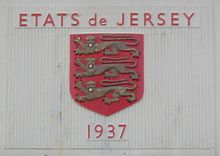 États de Jersey and arms on the original terminal building of Jersey Airport built by the States in 1937
États de Jersey and arms on the original terminal building of Jersey Airport built by the States in 1937
Until the constitutional reforms brought about in 1948 to strengthen the separation between legislature and judiciary, Jurats were the senior politicians, elected for life by islandwide suffrage, and were the presidents of committees and sat in the Royal Court. In 1948 the Jurats were replaced in the legislature by Senators, who at first were elected on an island-wide basis for mandates of 9 years (subsequently reduced to 6 years). The rectors were also removed from the States in 1948 (with the exception of the Dean as Rector of St. Helier, who remained but lost his vote), and replaced by an increased number of Deputies.
The urban-rural cleavage which successive reforms have attempted to address remains. The less populated rural parishes enjoy an electoral advantage over the densely populated urban parishes due to the inequity of the distribution of seats when compared to population.[citation needed]
A report produced under the chairmanship of Sir Cecil Clothier proposed a range of administrative reforms aimed at improving the machinery of government, including ending the distinction between Senators and Deputies, the removal of the Constables from the States and the removal of the Bailiff. However aspects of the report, especially concerning the rôle of Connétable, met with intense opposition at public meetings in the parishes. The ministerial system has been introduced in an amended form to that proposed by Clothier.
States Chamber
The States sat in the Royal Court until 1887 when the States Chamber was constructed adjacent to the Royal Court.[16] The chamber is in Jacobean style, with the benches arranged in horseshoe form around the twin seats of the Bailiff and Lieutenant Governor. The Bailiff's seat is raised slightly higher than that of the Lieutenant Governor to demonstrate his precedence.[citation needed]
Senators sit to the left of the Bailiff, then the Connétables, and then the Deputies filling up the benches to the right.
The States Chamber is depicted on the 2010 issue Jersey 20 pound note.
Broadcasting
BBC Radio Jersey broadcasts the main States sittings live on their medium wave frequency 1026 mW in Jersey, replacing the normal BBC Radio Jersey output which is a straight mirror of the FM output.
The raw feed of the States members talking is provided by the States of Jersey and goes through a desk in the BBC Radio Jersey Studio in the States Chamber where it is mixed by the States Reporter on duty that day.
The States output also includes Question Time which is also available on demand from bbc.co.uk/jersey split into the two separate sessions.
See also
References
- ^ "States of Jersey Law 2005". http://www.jerseylaw.je/Law/display.aspx?url=lawsinforce/htm/LawFiles/2005/l-08-2005.htm. Retrieved 2011-08-29.
- ^ "States of Jersey Law 2005". http://www.jerseylaw.je/Law/display.aspx?url=lawsinforce/htm/LawFiles/2005/l-08-2005.htm. Retrieved 2011-08-29.
- ^ "States of Jersey (Miscellaneous Provisions) Law 2011". http://www.jerseylaw.je/Law/display.aspx?url=lawsinforce%2Fhtm%2FLawFiles%2F2011%2FL-13-2011.htm. Retrieved 2011-10-20.
- ^ "Proposition P 99 of 2011", DRAFT STATES OF JERSEY (MISCELLANEOUS PROVISIONS) LAW 201-: REQUEST TO PRIVY COUNCIL, 6 June 2011, http://www.statesassembly.gov.je, retrieved 2011-10-20; BBC (2011 [last update]). "BBC News - Jersey petition to Privy Council over senator change". bbc.co.uk. http://www.bbc.co.uk/news/world-europe-jersey-13685192. Retrieved 20 October 2011.
- ^ States of Jersey Law 2005, Article 1 http://www.jerseylaw.je/Law/display.aspx?url=lawsinforce/htm/LawFiles/2005/l-08-2005.htm#_Toc88473877
- ^ States of Jersey Law 2005, Article 40 http://www.jerseylaw.je/Law/display.aspx?url=lawsinforce/htm/LawFiles/2005/l-08-2005.htm#_Toc88473923
- ^ States of Jersey Law 2005, Article 41 http://www.jerseylaw.je/Law/display.aspx?url=lawsinforce/htm/LawFiles/2005/l-08-2005.htm#_Toc88473924
- ^ Ben, Quérée (5 September 2011), "Move to get more ministers 'involved'", Jersey Evening Post: 9
- ^ Minutes of the States of Jersey, 15 March 2011 http://www.statesassembly.gov.je
- ^ "Jersey Evening Post Election 2008: St Helier No. 2". http://www.thisisjersey.com/election/deputies/st-helier-no-2/. Retrieved 2011-08-29.; {cite web | url = http://www.thisisjersey.com/election/deputies/st-helier-no-1/ | title = Jersey Evening Post Election 2008: St Helier No. 1 | accessdate = 2011-08-29}}
- ^ Querée, Ben (16 August 2010). "Is the party over?". Jersey Evening Post. http://www.thisisjersey.com/2010/08/16/is-the-party-over/. Retrieved 2011-08-29.
- ^ States of Jersey. "The Scrutiny Website". http://www.scrutiny.gov.je/. Retrieved 26 August 2011.
- ^ Morris, P.E.. "The new systems of government in the Channel Islands". Public Law (London: Sweet and Maxwell) [2008] (Autumn): 430. ISSN 00333565.
- ^ http://www.jerseylaw.je/law/display.aspx?url=lawsinforce%2fconsolidated%2f15%2f15.120_Codeof1771_RevisedEdition_1January2009.htm#Toc223147241
- ^ Balleine's History of Jersey, Marguerite Syvret and Joan Stevens (1998) ISBN 1-86077-065-7
- ^ [Guernsey Society wesbite "http://www.guernsey-society.org.uk/donkipedia/index.php5?title=States_Building"]. Guernsey Society wesbite. Retrieved 2011-08-29.
External links
- Official Assembly site
- States of Jersey government site
- Follow States of Jersey on Twitter
- Jersey Elections site
- ^1 Text of States of Jersey Law (2005)
- Commonwealth Parliamentary Association article - Large 20MB file
Parliament of Europe Sovereign
states- Albania
- Andorra
- Armenia
- Austria
- Azerbaijan
- Belarus
- Belgium
- Bosnia and Herzegovina
- Bulgaria
- Croatia
- Cyprus
- Czech Republic
- Denmark
- Estonia
- Finland
- France
- Georgia
- Germany
- Greece
- Hungary
- Iceland
- Ireland
- Italy
- Kazakhstan
- Latvia
- Liechtenstein
- Lithuania
- Luxembourg
- Macedonia
- Malta
- Moldova
- Monaco
- Montenegro
- Netherlands
- Norway
- Poland
- Portugal
- Romania
- Russia
- San Marino
- Serbia
- Slovakia
- Slovenia
- Spain
- Sweden
- Switzerland
- Turkey
- Ukraine
- United Kingdom
- (England
- Northern Ireland
- Scotland
- Wales)
States with limited
recognition- Abkhazia
- Kosovo
- Nagorno-Karabakh
- Northern Cyprus
- South Ossetia
- Transnistria
Dependencies
and other territories- Åland
- Faroe Islands
- Gibraltar
- Guernsey
- Jan Mayen
- Jersey
- Isle of Man
- Svalbard
Other entities - European Union
Coordinates: 49°10′54″N 2°06′28″W / 49.18154°N 2.10766°W
Categories:- Politics of Jersey
- Parliaments by country
- Unicameral legislatures
- Jersey law
Wikimedia Foundation. 2010.
Look at other dictionaries:
States of Jersey — the legislative body for the Bailiwick of Jersey. Collins dictionary of law. W. J. Stewart. 2001 … Law dictionary
States of Jersey — Die States of Jersey (Französisch: États de Jersey) sind das Parlament und die Regierung der Kanalinsel Jersey. Das „States of Jersey“, die schon im 16. Jahrhundert bestanden, waren eine Ständeversammlung, bestehend aus dem Oberrichter (Bailiff) … Deutsch Wikipedia
States of Jersey Customs and Immigration Service — Head Of Service Michael Robinson Controlling body Ministry For Home Affairs Customs Excise Formally known as The Bureau des Impôts, the Customs Excise section holds one of the oldest government posts in Jersey. The Agent of the Impôts, now Head… … Wikipedia
States of Jersey Police — See also: Law of Jersey , Courts of Jersey , Bailiff of Jersey , Bailiff (Channel Islands) , Jurat , Norman law , and Advocate States of Jersey Police Area covered Area Jersey … Wikipedia
Jersey Telecom — is the former monopoly incumbent operator in the Bailiwick of Jersey. Jersey is incorporated into the UK National Telephone Numbering Plan [http://www.ofcom.org.uk/telecoms/ioi/numbers/numbers administered/] area codes of 44 1534 for landlines… … Wikipedia
Jersey Express S.C. — Jersey Express Full name Jersey Express Soccer Club Nickname(s) Ironbound Founded 2007 (as Newark Ironbound Expre … Wikipedia
Jersey pound — Jersey pound … Wikipedia
Jersey Democratic Alliance — Chairman Christine Papworth Founded 2005 Ideology Centre left International affiliation none … Wikipedia
Jersey general election, 2011 — Jersey This article is part of the series: Politics and government of Jersey … Wikipedia
Jersey Legal French — Français de Jersey Spoken in Jersey Native speakers 17,000 (date missing) Language family Indo European … Wikipedia

